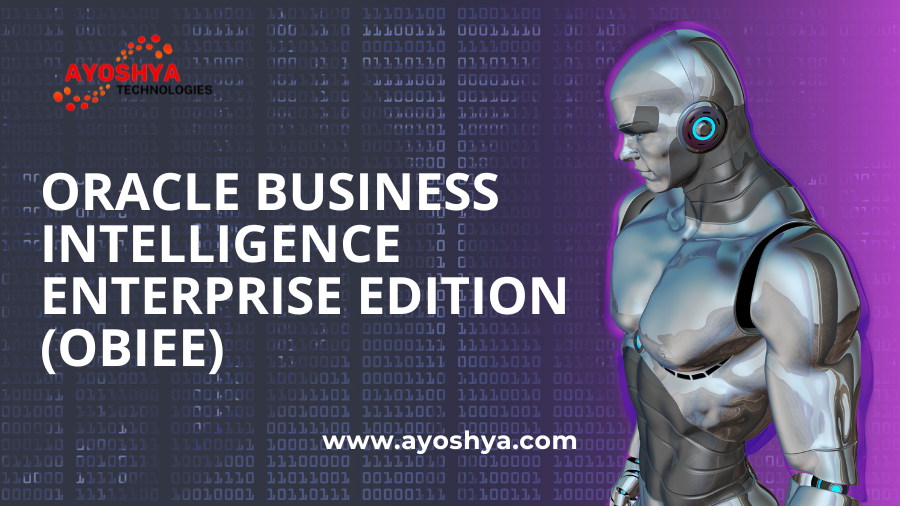Oracle OBIEE : Power of Data Insights
Introduction
In the ever-evolving landscape of business intelligence, organizations seek powerful tools to extract meaningful insights from their data. Oracle OBIEE (Business Intelligence Enterprise Edition) steps into this role, providing a comprehensive and intuitive platform for transforming raw data into actionable intelligence. This article is your guide to understanding OBIEE, its features, applications, and how it empowers organizations to make informed decisions.
Understanding Oracle OBIEE (Business Intelligence Enterprise Edition)
OBIEE is a business intelligence platform by Oracle that enables organizations to uncover insights, visualize data, and share analytics across the enterprise. It offers a suite of tools for reporting, ad-hoc query analysis, dashboards, and scorecards, making it a versatile solution for diverse business intelligence needs.
Key Components
- Oracle BI Server: The central component that provides a unified view of data from various sources, ensuring consistency in reporting.
- Oracle BI Presentation Services: Enables the creation and presentation of interactive reports and dashboards.
- Oracle BI Scheduler: Automates report generation, distribution, and delivery based on predefined schedules.
- Oracle BI Repository: A metadata layer that abstracts the underlying data sources, providing a logical business view.
Benefits of Oracle Business Intelligence Enterprise Edition
- Actionable Insights: Transform data into actionable insights, facilitating data-driven decision-making.
- Scalability: Scale to meet the growing demands of data and users without compromising performance.
- User-Friendly Interface: Intuitive interface for business users, enabling self-service analytics.
Real-world Applications
OBIEE finds applications across various industries:
- Finance: Analyze financial data, track key performance indicators (KPIs), and generate financial reports.
- Healthcare: Monitor patient outcomes, optimize resource allocation, and track healthcare performance metrics.
- Retail: Analyze sales trends, customer behavior, and inventory management for strategic decision-making.
- Manufacturing: Optimize supply chain operations, monitor production efficiency, and analyze quality metrics.
Integration Capabilities
OBIEE seamlessly integrates with Oracle’s broader ecosystem, including Oracle Database, Oracle Cloud, and other Oracle applications. This integration ensures a unified data environment for comprehensive analytics.
Usage Scenarios
- Ad-hoc Reporting:
- Empower users to create ad-hoc reports and analyze data without depending on IT support.
- Dashboard Creation:
- Develop interactive dashboards with drag-and-drop functionality for real-time data visualization.
- Scheduled Report Delivery:
- Set up automated schedules for report generation and distribution to relevant stakeholders.
- Predictive Analytics:
- Utilize advanced analytics capabilities for predictive modeling and forecasting.
Advanced Functionalities
- Mobile Analytics:
- Access and interact with reports and dashboards on the go with OBIEE’s mobile capabilities.
- Data Mashups:
- Combine data from multiple sources for a comprehensive view, facilitating more informed decision-making.
- Collaboration Features:
- Foster collaboration by enabling users to share insights, comments, and annotations within the platform.
OBIEE vs. Other Business Intelligence Tools
Compared to standalone business intelligence tools, OBIEE offers the advantage of being part of the Oracle ecosystem. This integration ensures seamless compatibility with Oracle databases and applications, streamlining the implementation and maintenance process.
Implementation Best Practices
For successful implementation and utilization of OBIEE:
- User Training: Provide comprehensive training to users to maximize the platform’s capabilities.
- Data Quality Assurance: Ensure data quality through thorough validation and cleansing processes.
- Regular Updates: Stay current with the latest updates and patches to benefit from new features and improvements.
Security Measures
- Access Control:
- Implement role-based access controls to restrict user access to specific reports and data.
- Data Encryption:
- Ensure the security of sensitive data by implementing encryption measures during data transmission and storage.
User Experience and Interface
OBIEE offers a user-friendly interface that caters to both business users and IT professionals. Its drag-and-drop features, interactive dashboards, and customizable reports contribute to a positive and efficient user experience.
Customization Options
Customization in OBIEE involves tailoring reports, dashboards, and metadata models to align with specific business requirements. This flexibility ensures that organizations can mold OBIEE to suit their unique analytics needs.
Future Trends and Innovations
As the landscape of business intelligence evolves, OBIEE is expected to incorporate emerging technologies. Anticipated trends include increased integration with artificial intelligence for advanced analytics and enhanced support for augmented analytics.
User Testimonials
Organizations share their experiences with OBIEE, emphasizing its role in streamlining analytics processes, fostering data-driven cultures, and providing a centralized platform for business intelligence.
Challenges and Solutions
While OBIEE is a powerful tool, organizations may encounter challenges during implementation. This section addresses common challenges and provides effective solutions to ensure a successful deployment and utilization.
Frequently Asked Questions
- Can OBIEE integrate with non-Oracle databases?
- Yes, OBIEE supports integration with various data sources, including non-Oracle databases.
- Is OBIEE suitable for small businesses?
- Yes, OBIEE is scalable and can be tailored to the needs of small businesses.
- What training resources are available for OBIEE users?
- Oracle provides comprehensive training resources, including documentation, tutorials, and online courses.
- Can OBIEE handle real-time analytics?
- Yes, OBIEE supports real-time analytics for up-to-the-minute insights.
- Is OBIEE suitable for cloud-based deployments?
- Yes, OBIEE can be deployed on Oracle Cloud Infrastructure, providing flexibility for cloud-based analytics.
Conclusion
In conclusion, Oracle Business Intelligence Enterprise Edition emerges as a powerhouse in the business intelligence landscape, offering organizations a robust platform for analytics and data-driven decision-making. From ad-hoc reporting to predictive analytics, OBIEE empowers users to harness the power of data for strategic advantage.
You may be interested in:
Oracle Consulting: the Power of Digital Transformation



